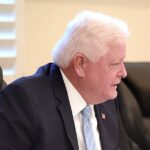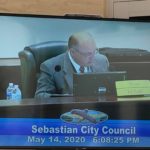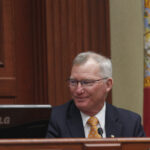VERO BEACH — Yes, there were two versions of the electric contract, and they had a number of differences.
And so another veil was rent in the saga of the Vero Beach’s deal with the Orlando Utilities Commission when City Attorney Charles Vitunac last week admitted there were, in fact, significant differences between the sanitized “final draft” of the Orlando contract approved by the City Council and the full version subsequently signed by then-Mayor Tom White. “The City Attorney knows he’s at a point where he’s got to come clean because there are too many people and legal eyes looking at what’s going on,” said Councilman Brian Heady.
The revelation at last week’s City Council meeting that there had been more than 100 changes in the document from the time it was approved to the time it was signed, disclosed first in an article in Vero Beach 32963, sparked yet another round of questioning of the city attorney who in the end, agreed with Heady that the changes were material.
“Obviously they were material to someone or they wouldn’t have been changed,” Heady said during the meeting.
“They’re all material in that they make the contract better, but they don’t change the meaning of the contract,” Vitunac responded.
Heady has a problem with even one minor change, let alone nine pages of altered definitions, whole sections added and deleted, and dates and numbers changed.
“When you have a redacted and unredacted version of a contract, you should be able to print it out on a transparency and line them up and it should match up letter for letter,” said Heady. “These two documents definitely don’t do that.”
Vero Beach 32963 reported last week that a comparison of the draft contract and the final version found more than 100 changes that had been made.
In early December, Vitunac was asked to go over the versions and determine where the changes were and whether they were significant. In mid-December, Vero Beach 32963 requested a copy of Vitunac’s opinion on the changes. On Dec. 28, Assistant City Attorney Wayne Coment informed the publication that while Vitunac was on vacation all week, the female members of his legal staff took on the job of comparing both of the 68-page documents line by line.
Coment said he wasn’t assigned to work on the project himself. Vitunac returned from vacation on Jan. 4 and his office completed its nine-page table of changes just before the Jan. 5 council meeting, during which he presented members with the findings and assured them that nothing untoward had occurred.
The nine pages, however, showed where the document had been changed, but provided no explanations for any of the changes.
“They are just things that make the contract clearer,” Vitunac told the council. “I’ve been through all those changes and none of them changes the meaning of the contract.”
“I want to know what was changed, who made the changes, why they made the changes and when they were made,” Heady said at the meeting.
Heady turned to White at one point and asked whether or not Vitunac or any other city staff told him that there had been changes, even minor changes, made to the document when he was asked to sign the contract.
“I wasn’t there, but I’d like to know if they gave you this contract and said to you, ‘Oh, by the way, there’s a bunch of changes in this but just sign your name anyway’,” Heady asked.
White lowered his head and said, “no.”
“I believe that Mayor White was not made aware of these changes and I have real concerns that our Mayor was given a contract to sign that contained 115 changes,” Heady said.
It’s not clear who – other that Vitunac, consultant Sue Hersey and Boston attorney Meabh Purcell – knew about the changes.
As records of the recent grand jury probe reveal, Gabbard told State Attorney Bruce Colton’s office that the only change made to the contract was an expansion of the hold harmless clause, which was requested by the council.
It is unclear if Gabbard knew about the other changes, or if he did not provide state attorney’s investigator Ed Arens, who used to work for him at the Vero Police Department, with all the information.
Calls to Gabbard’s office for this article drew no response.
Heady is not convinced that a massive effort by attorneys to change, or even just to clarify, a contract after it’s been approved by the City Council is prudent or legal. He sent Vitunac back to the document and asked for a more in-depth report at the Jan. 19 council meeting.
“The mayor has admitted in public, in chambers, that he wasn’t told of the changes,” Heady said. “I think the contract is not valid and I’m going to bring it up at the next meeting.”
Though he’s a supporter of the city’s new relationship with OUC, Heady wants to ensure that the city’s 20-year, $2 billion contract with OUC is completely legal and not vulnerable to a challenge.
Heady wants a do-over – for the council to vote again to approve the contract. Should the city take no steps to do that, Heady said the city opens itself up to lengthy and expensive litigation.
“The contract that was signed was not the same contract and that could mean that the contract is not valid. There are a good number of people out there who would file a suit about this,” he said. “If they want to go forward with the contract, then they need to re-approve the contract.”
Vitunac admitted that the city’s high-priced consultants requested and made the changes, but Heady holds Vitunac responsible for the secrecy. The reason all this is coming out now is because the complete, signed version of the contract was kept under wraps until September due to so-called “trade secrets.”
Unlike ousted City Councilman Charlie Wilson, who had claimed Vitunac was not a particularly adept city attorney, Heady sees this failure not as a lack of competence, but a lack of leadership.
“I think the City Attorney is very qualified, but I think he lacks direction. I think if he is told this is what we want, he’ll do it,” Heady said. “I don’t think he wants to get fired for cause.”






